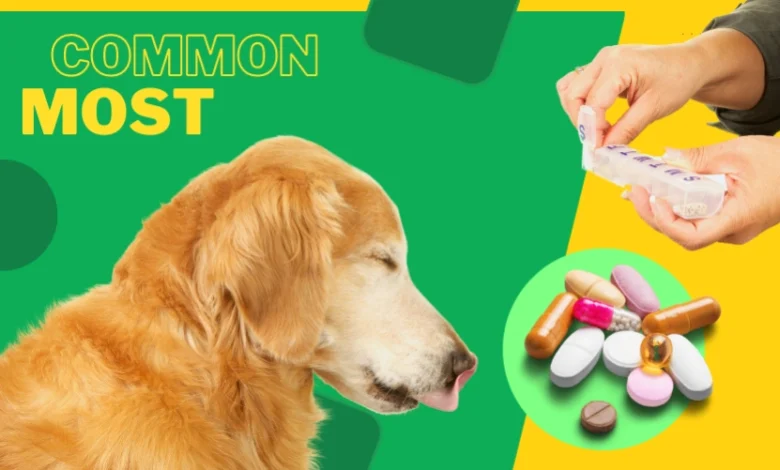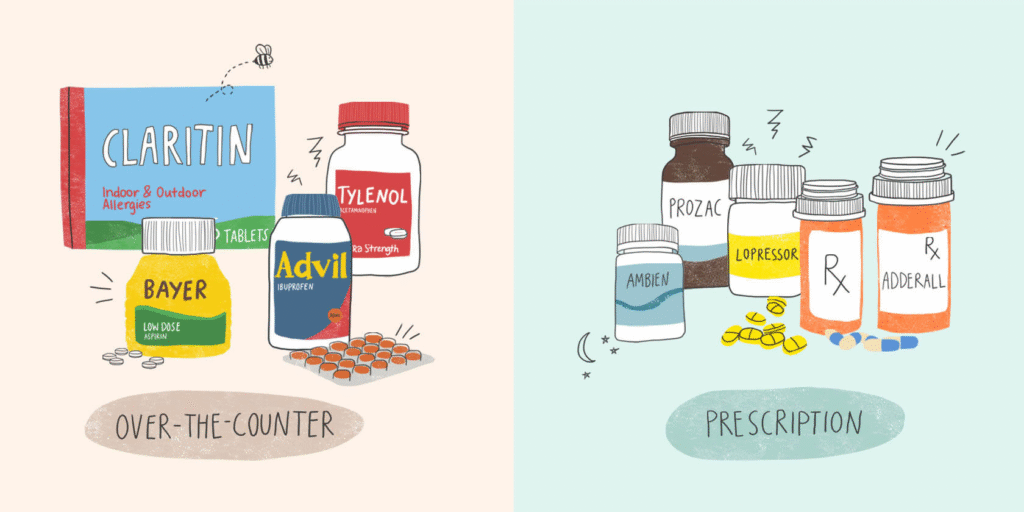
Summary
Over-the-counter (OTC) human medications are not automatically safe for dogs, and many can be toxic or even fatal. Drugs like ibuprofen, acetaminophen, and certain cold or allergy medicines can cause serious harm to a dog’s liver, kidneys, or digestive system. Even if a medication is safe for humans, the dosage and effects can be very different in dogs. Pet owners should never give any human medication without first consulting a veterinarian, as a vet can recommend safe alternatives or provide the correct dosing for approved medications.

Explanation
Although we treat and love our dogs like children, dogs are not small people. The same medications that safely work in children or adults are not necessarily safe in dogs.
While it’s true that vets may prescribe human medications for dogs, there are important differences in drug tolerances, side effects, dose ranges, and applications. For example, veterinary medicines are dosed based on your dog’s weight, while human medications are often dosed based on age.
Even if you think it’s safe to give your dog a human medication, you should always ask your vet first. This might seem inconvenient, but giving your dog an over-the-counter (OTC) medication can cause more harm than good or even make your dog’s existing health condition worse.
Your dog may also have a specific condition or reason that means it’s not okay to give them a medication that might be okay for another dog.
Many human medications, even seemingly harmless ones, can be toxic to dogs and cause serious health issues like stomach ulcers, kidney failure, or liver damage. It’s crucial to consult with a veterinarian before administering any medication to a dog, human or otherwise.
Here’s why:
- Different Metabolisms:Dogs and humans metabolize medications differently. A dose that is safe for a child could be toxic to a dog of similar size.
- Specific Dangers:
- NSAIDs: Human NSAIDs like ibuprofen (Advil, Motrin) and naproxen (Aleve) can cause severe stomach and intestinal ulcers, kidney failure, and even liver damage in dogs.
- Acetaminophen: Acetaminophen (Tylenol) can cause liver damage and red blood cell damage in dogs.
- Allergy/Decongestant Medications: Some allergy and decongestant medications, like those containing pseudoephedrine or phenylephrine, can cause hyperactivity, increased heart rate, seizures, and even respiratory and cardiac failure.
- Masking Symptoms:
OTC medications may temporarily relieve symptoms, but they can mask the underlying cause of illness, making it harder for a veterinarian to diagnose and treat the problem.
Potential Drug Interactions:
If a dog is already taking other medications, OTC drugs can interact negatively with them.
Dosage Issues:
OTC medications are formulated for human use and may be available in dosages that are inappropriate for dogs.
When in doubt, always consult a veterinarian or an emergency animal hospital before giving any medication to your dog.
Can This OTC Medication Treat Me and My Pet?
Have you ever wondered if some of the over-the-counter (OTC) medications you have around the house could also be used on your pup or cat? As it turns out, you can treat your fur babies with some OTCs depending on the circumstances. But don’t get too eager—some human medications can also be deadly for your pets. You should always check with your veterinarian first, but you can use this quick guide to learn which OTC medications are safe or unsafe for your furry friends in the meantime.
Constipation:
Have you noticed that your dog is having trouble passing their bowel movements, or that your cat is going in and out of the litter box? It’s possible that they could be dealing with a bit of constipation. We’ve all been there, and MiraLAX can be just as useful for our four-legged friends to get their bowels moving. How much to give depends on the size of your pet. For smaller cats and dogs (less than 10 pounds for a cat and 30 pounds for a dog), you can sprinkle 1/8 – ¼ teaspoon of MiraLAX into their wet food twice daily; for larger dogs (over 55 pounds) you can mix ½ – ¾ teaspoons twice daily. Be sure to keep your pet hydrated with plenty of water, and check with your vet before administering.
Allergies:
Has your pet been sneezing or outside playing with those beehives again? Medications like diphenhydramine or cetirizine can relieve your pet’s allergy symptoms, and as explained below, you should avoid medications with decongestants that are harmful to dogs and cats. The amount of allergy medication you give to your pet is important to avoid side effects or overdose, so only use these medications after talking to your vet first.
OTC Medications that Pets Should Avoid:
- Acetaminophen (Tylenol). High doses of this medication can cause liver failure and death in dogs and cats.
- Decongestants (Sudafed, Claritin-D, Mucinex-D). Any medications containing phenylephrine or pseudoephedrine can cause seizures and hyperactivity in dogs and cats.
- Vitamins. Most human vitamins are unsafe and can cause liver failure in dogs and cats.
- Pepto Bismol. Although safe to use for dogs with upset stomachs, Pepto Bismol can cause bloody stools, dehydration, and death in cats.
- Ibuprofen (Advil, Motrin) and Naproxen (Aleve). NSAIDs can cause stomach ulcers and kidney failure in dogs and cats just like these medications can in humans.
- Kaopectate. Because this medication has recently been reformulated with aspirin, Kaopectate is no longer recommended to be used in cats.
Summary:
Luckily, there are likely some OTC products already in your household, or easily accessible at your local pharmacy, that can be used to help your furry friends in mild and moderate scenarios. But know that this does not apply to all OTC medications. Make sure to always check in with your pet’s veterinarian for approval before giving them any unprescribed medication.
FAQs: Over-the-Counter Human Medications and Dogs
1. Can I give my dog ibuprofen or acetaminophen?
No, both can be toxic to dogs and may cause liver, kidney, or stomach damage.
2. Are any human medications safe for dogs?
Some may be safe in specific doses, but only under a veterinarian’s guidance.
3. Can I give my dog cold or allergy medicine?
Some allergy medications like diphenhydramine can be safe, but only with vet-approved dosing. Many cold medicines contain dangerous ingredients.
4. What should I do if my dog accidentally eats human medicine?
Call your veterinarian or an emergency animal hospital immediately.
5. What is the safest way to treat my dog’s pain or illness?
Always consult your veterinarian for safe, dog-specific medications and dosing.
Need Veterinary Help?
Have questions about animal health, management, diseases, or treatments? Our professional veterinary team is here to help you!
Consult Online: Contact Us
Email: professionaldvm129@gmail.com
Visit: www.veterina








https://shorturl.fm/yLDBj